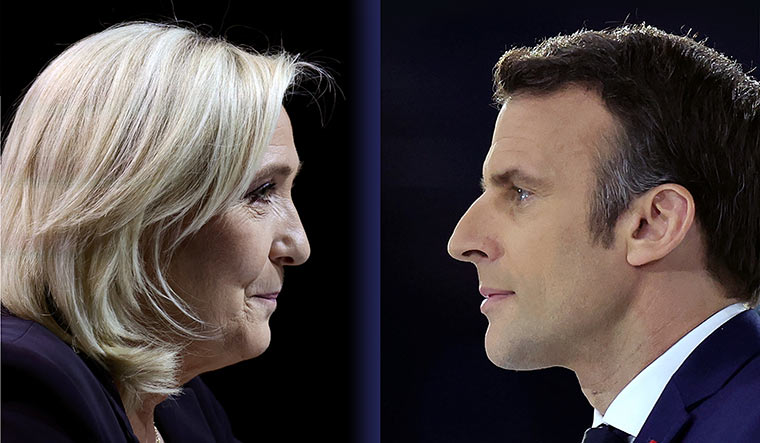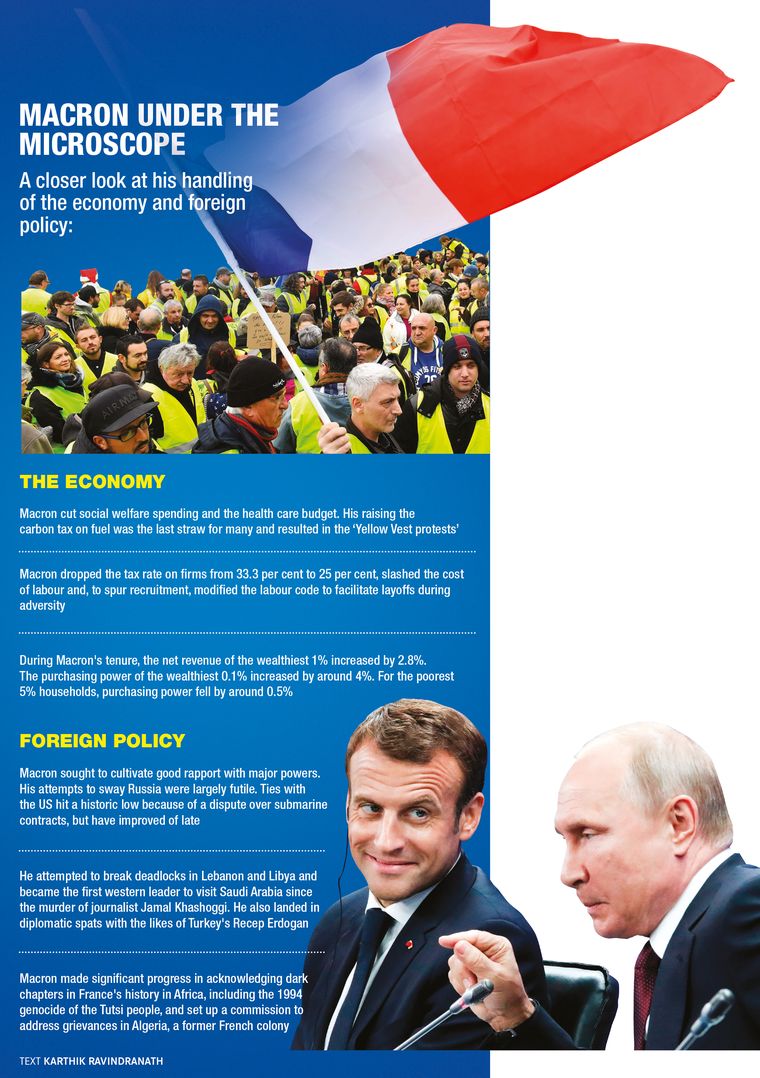A few days before the first round of the French presidential elections on April 10, liberal newspaper Le Monde published a cartoon showing President Emmanuel Macron on the phone with Russian President Vladimir Putin. Macron was shown turning away from the crowd at an election rally and saying: “Vladimir, I am just finishing with this chore and I will call you back.” As he faces a stiff challenge in the April 24 runoff with far right leader Marine Le Pen in a repeat of the 2017 contest, Macron seems to have realised that his preoccupation with foreign policy and absence from the campaign scene was a major error in judgment. An opinion poll taken on April 10 puts Le Pen at 49 per cent against Macron’s 51 per cent, well within the margin of error.
Macron, who ran as an upstart disruptor in 2017, had been acting like an aloof establishmentarian till the first round of elections. He announced his candidacy only on March 2, just a day before the deadline, and refused to attend a campaign rally till April 2. He shunned debates with other candidates. On March 14, when he took part in a television programme, his team ensured that all of them were interviewed separately. Macron’s strategy was to present himself as being above the rest of the crowd. “His choice to remain as head of state till the end prevented him from becoming a real candidate,” said Vincent Martigny, who teaches political science at the University of Nice.
In the end, however, it did not matter much, at least in the first round. Macron topped the race with 27.8 per cent, compared with 24 per cent in 2017. Le Pen finished second with 23.1 and the far left candidate Jean-Luc Mélenchon came third with 22 per cent. But the comfortable lead he enjoyed in the first round may not be enough for Macron as the runoff will also be a referendum of his performance as president.
During his five years in the Élysée Palace, Macron largely followed a top-down style. His controversial pension reform was forced through the parliament without a vote, although it was abandoned later because of the pandemic. One reason behind such autocratic decision-making is the total decimation of the traditional party structure in France, triggered largely by Macron’s victory in 2017. Macron presented himself as an alternative to both centre right and centre left voters. It led to the collapse of the socialists and the conservatives, the two major political groups that ruled France since the establishment of the Fifth Republic in 1958.
Macron took over the centre, poached leaders from the two traditional parties and launched a political movement of his own, called La République En Marche (The Republic On the Move). There are not many charismatic leaders in the party, and there is not much internal democracy. People hardly even know Prime Minister Jean Castex, as all authority is concentrated in the president.
Notwithstanding his aloofness and the dictatorial style of functioning, Macron’s supporters have been hoping that his handling of the economy and foreign policy would help him win another term. His foreign policy was headlined by a stronger Europe, effective multilateralism on global issues and France’s growing role as a balancing power in crisis zones. Macron also widened the scope of French involvement in Africa by going beyond Francophone Africa, even as he retained the traditional French presence in the Sahel. He tried to engage with Russia and China, and despite falling out with Joe Biden over the formation of the AUKUS (Australia-UK-US) alliance, ties with the US have been largely robust.
Under Macron, France did well economically, registering the strongest growth in 50 years and performing better than other major European economies, despite the ravages of the pandemic. But his decision to lower taxes for businesses and ease labour laws have been unpopular. An increase in the price of diesel in 2018 gradually morphed into the ‘Yellow Vest protests’ which showed the growing disconnect between the poor and the governing elites in Paris. Macron, however, survived the crisis riding on the overall strength of the economy.
The war and the sanctions on Russia have caused a sharp spike in inflation. Food prices went up by 4.5 per cent in March, while energy prices grew by 29 per cent. The crisis gave Le Pen an unexpected opening. She roundly criticised Macron for his inability to rein in Putin and for the impact the sanctions were having on ordinary people. “Cutting off Russian energy would be a tragedy for French families,” said Le Pen. “My priority is to defend the purchasing power of French families.”
Last November, after far right pundit Éric Zemmour announced his decision to join the presidential race, most observers were prepared to write Le Pen’s political obituary. There were op-eds which concluded that Zemmour would supplant her as the far right’s choice. As Le Pen looked tired, spent and devoid of ideas, Zemmour ran an energetic campaign, warning about the “great displacement”—a wave of immigrants replacing the native French—turning France into a Muslim-majority country. Even Le Pen’s niece Marion Maréchal joined him.
But, by March, things started turning around for Le Pen as the Zemmour campaign unravelled. Zemmour’s extreme rhetoric on issues such as Islam, immigration and crime helped Le Pen project a moderate, measured and calm image. Though she was a major Putin supporter and received financial assistance from Russia, Le Pen was quick to denounce the invasion and to welcome Ukrainian refugees, unlike Zemmour, who dithered for a week. It marked a revival of her fortunes as she took back the mantle of the far right. Going into the second round of presidential polls, she appears less radical and more pragmatic, although her agenda does not differ much from that of Zemmour’s.
Le Pen’s strategy to improve her image, however, was not sudden or drastic. She has been doing that ever since she took over the National Front, founded in the 1970s by her father, Jean-Marie Le Pen, a veteran of the Algerian War. In an effort to detoxify the party, she even expelled her father, condemning his racist views and anti-Semitic rhetoric.
After losing to Macron in the 2017 elections, she renamed the party the National Rally, and tweaked its agenda by abandoning ideas that worried centrist voters. She dropped the demand for reinstating death penalty and for France to leave the European Union. She has even taken up causes dear to the left such as hikes in pensions and welfare payments, lowering the retirement age, opposition to privatisation of public services and trade protectionism to defend French interests.
As she runs a tight race against Macron, Le Pen has indicated that if she is elected president, she would form a national unity government and would appoint ministers from across the political spectrum, including the left and right, ostensibly with an eye on centrist voters who still remain suspicious about her.
On the personal front, too, Le Pen has attempted an image makeover. When her niece defected to the Zemmour camp, she did not appear bitter or resentful. She said she had brought her up like a daughter and the decision was extremely painful. She tactfully avoided mentioning that they differed ideologically and that Maréchal, once touted as her successor, was increasingly sidelined in the party. Once on the campaign trail in Dunkirk, she posed for a selfie with a Muslim teenager wearing a headscarf, despite her opposition to donning headscarf in public places.
She opened up about her private life, revealing that she no longer has a boyfriend and that she would live alone in the presidential palace with her cats, if she won the polls. Le Pen owns six cats and recently got a diploma to become a registered cat breeder. She made peace with her mother with whom she was not on talking terms for 15 years. Even as she put up a softened image, Le Pen has been campaigning hard, especially across provincial France. As inflation has hit the working class badly, her focus is on issues affecting their purchasing power and the rising cost of living.
Although the race has tightened significantly, Macron still retains the edge. But winning over the support of the far left would be the key. As the first round results clearly indicate, France remains divided into three blocs—the centre dominated by Macron, the far right under Le Pen and the far left led by Mélenchon.
With not much to gain from the grand old parties, Macron will have to look at the anti-NATO, anti-EU, protectionist Mélenchon for support. While Socialist candidate Anne Hidalgo and Republican Valérie Pécresse professed support for Macron, Mélenchon has, so far, refused to endorse the president. While he clearly asked his supporters to avoid Le Pen at any cost, in the absence of a positive endorsement for Macron, many of his supporters could abstain on April 24. “Macron needs to convince voters that voting for him is not only in order to avoid Le Pen becoming president, but that he will, if reelected, listen to those who reject some of his planned reforms, especially that of raising retirement age,” said Jean-Yves Camus, associate researcher at the Institute of International and Strategic Relations, Paris. “Macron also needs to avoid being seen as too arrogant.”
Camus said Le Pen should focus on her credibility. “For that she needs to do better in her debate with Macron on April 20, than she did in 2017. She will also stress the fact that she is the only one who can oust Macron,” said Camus.
Le Pen, meanwhile, continues to woo the Mélenchon cohort assiduously, even as she keeps her base happy by promising a referendum on immigration, an amendment to the constitution to give native French people priority in welfare benefits, housing, jobs and health care and a ban on the Muslim headscarf from public places. Winning over the mainstream voters, therefore, could prove to be a challenge for her, despite her image makeover. After all, as Gideon Rachman of the Financial Times pointed out, while speaking on her diploma on cat breeding, she told Le Monde that she loved studying their “genetic characteristics to allow for the perfection of the race”. It may not be a comforting thought for the moderate voters as they wait for April 24.



